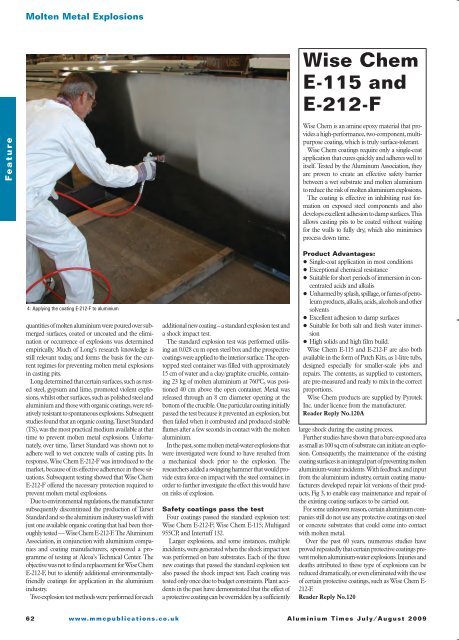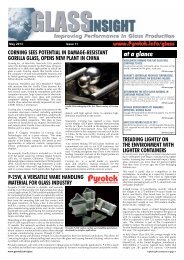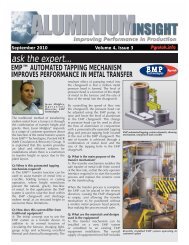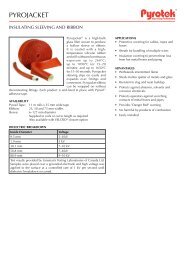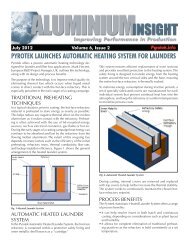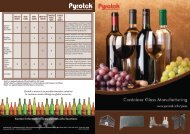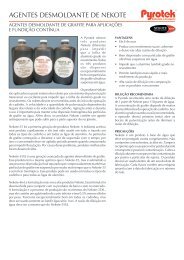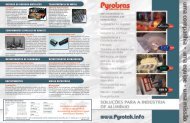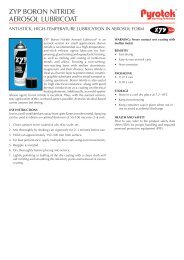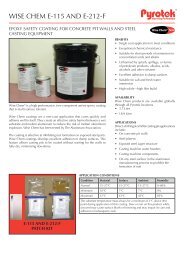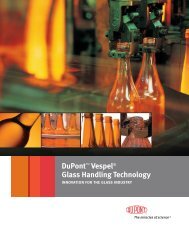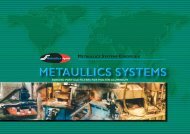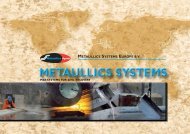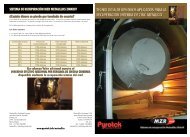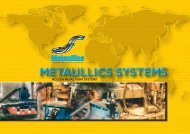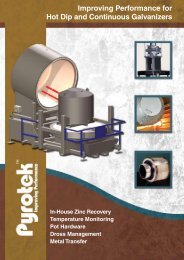Safety Coatings Reduce Risk of Molten Aluminium ... - Pyrotek
Safety Coatings Reduce Risk of Molten Aluminium ... - Pyrotek
Safety Coatings Reduce Risk of Molten Aluminium ... - Pyrotek
Create successful ePaper yourself
Turn your PDF publications into a flip-book with our unique Google optimized e-Paper software.
Feature<br />
<strong>Molten</strong> Metal Explosions<br />
4: Applying the coating E-212-F to aluminium<br />
quantities <strong>of</strong> molten aluminium were poured over submerged<br />
surfaces, coated or uncoated and the elimination<br />
or occurrence <strong>of</strong> explosions was determined<br />
empirically. Much <strong>of</strong> Long’s research knowledge is<br />
still relevant today, and forms the basis for the current<br />
regimes for preventing molten metal explosions<br />
in casting pits.<br />
Long determined that certain surfaces, such as rusted<br />
steel, gypsum and lime, promoted violent explosions,<br />
whilst other surfaces, such as polished steel and<br />
aluminium and those with organic coatings, were relatively<br />
resistant to spontaneous explosions. Subsequent<br />
studies found that an organic coating, Tarset Standard<br />
(TS), was the most practical medium available at that<br />
time to prevent molten metal explosions. Unfortunately,<br />
over time, Tarset Standard was shown not to<br />
adhere well to wet concrete walls <strong>of</strong> casting pits. In<br />
response, Wise Chem E-212-F was introduced to the<br />
market, because <strong>of</strong> its effective adherence in these situations.<br />
Subsequent testing showed that Wise Chem<br />
E-212-F <strong>of</strong>fered the necessary protection required to<br />
prevent molten metal explosions.<br />
Due to environmental regulations, the manufacturer<br />
subsequently discontinued the production <strong>of</strong> Tarset<br />
Standard and so the aluminium industry was left with<br />
just one available organic coating that had been thoroughly<br />
tested — Wise Chem E-212-F. The Aluminum<br />
Association, in conjunction with aluminium companies<br />
and coating manufacturers, sponsored a programme<br />
<strong>of</strong> testing at Alcoa’s Technical Center. The<br />
objective was not to find a replacement for Wise Chem<br />
E-212-F, but to identify additional environmentallyfriendly<br />
coatings for application in the aluminium<br />
industry.<br />
Two explosion test methods were performed for each<br />
additional new coating – a standard explosion test and<br />
a shock impact test.<br />
The standard explosion test was performed utilising<br />
an 0.028 cu m open steel box and the prospective<br />
coatings were applied to the interior surface. The opentopped<br />
steel container was filled with approximately<br />
15 cm <strong>of</strong> water and a clay/graphite crucible, containing<br />
23 kg <strong>of</strong> molten aluminium at 760°C, was positioned<br />
40 cm above the open container. Metal was<br />
released through an 8 cm diameter opening at the<br />
bottom <strong>of</strong> the crucible. One particular coating initially<br />
passed the test because it prevented an explosion, but<br />
then failed when it combusted and produced sizable<br />
flames after a few seconds in contact with the molten<br />
aluminium.<br />
In the past, some molten metal-water explosions that<br />
were investigated were found to have resulted from<br />
a mechanical shock prior to the explosion. The<br />
researchers added a swinging hammer that would provide<br />
extra force on impact with the steel container, in<br />
order to further investigate the effect this would have<br />
on risks <strong>of</strong> explosion.<br />
<strong>Safety</strong> coatings pass the test<br />
Four coatings passed the standard explosion test:<br />
Wise Chem E-212-F; Wise Chem E-115; Multigard<br />
955CP, and Intertuff 132.<br />
Larger explosions, and some instances, multiple<br />
incidents, were generated when the shock impact test<br />
was performed on bare substrates. Each <strong>of</strong> the three<br />
new coatings that passed the standard explosion test<br />
also passed the shock impact test. Each coating was<br />
tested only once due to budget constraints. Plant accidents<br />
in the past have demonstrated that the effect <strong>of</strong><br />
a protective coating can be overridden by a sufficiently<br />
Wise Chem<br />
E-115 and<br />
E-212-F<br />
Wise Chem is an amine epoxy material that provides<br />
a high-performance, two-component, multipurpose<br />
coating, which is truly surface-tolerant.<br />
Wise Chem coatings require only a single-coat<br />
application that cures quickly and adheres well to<br />
itself. Tested by the Aluminum Association, they<br />
are proven to create an effective safety barrier<br />
between a wet substrate and molten aluminium<br />
to reduce the risk <strong>of</strong> molten aluminium explosions.<br />
The coating is effective in inhibiting rust formation<br />
on exposed steel components and also<br />
develops excellent adhesion to damp surfaces. This<br />
allows casting pits to be coated without waiting<br />
for the walls to fully dry, which also minimises<br />
process down time.<br />
Product Advantages:<br />
• Single-coat application in most conditions<br />
• Exceptional chemical resistance<br />
• Suitable for short periods <strong>of</strong> immersion in concentrated<br />
acids and alkalis<br />
• Unharmed by splash, spillage, or fumes <strong>of</strong> petroleum<br />
products, alkalis, acids, alcohols and other<br />
solvents<br />
• Excellent adhesion to damp surfaces<br />
• Suitable for both salt and fresh water immersion<br />
• High solids and high film build.<br />
Wise Chem E-115 and E-212-F are also both<br />
available in the form <strong>of</strong> Patch Kits, as 1-litre tubs,<br />
designed especially for smaller-scale jobs and<br />
repairs. The contents, as supplied to customers,<br />
are pre-measured and ready to mix in the correct<br />
proportions.<br />
Wise Chem products are supplied by <strong>Pyrotek</strong><br />
Inc. under licence from the manufacturer.<br />
Reader Reply No.120A<br />
large shock during the casting process.<br />
Further studies have shown that a bare exposed area<br />
as small as 100 sq cm <strong>of</strong> substrate can initiate an explosion.<br />
Consequently, the maintenance <strong>of</strong> the existing<br />
coating surfaces is an integral part <strong>of</strong> preventing molten<br />
aluminium-water incidents. With feedback and input<br />
from the aluminium industry, certain coating manufacturers<br />
developed repair kit versions <strong>of</strong> their products,<br />
Fig 3, to enable easy maintenance and repair <strong>of</strong><br />
the existing coating surfaces to be carried out.<br />
For some unknown reason, certain aluminium companies<br />
still do not use any protective coatings on steel<br />
or concrete substrates that could come into contact<br />
with molten metal.<br />
Over the past 60 years, numerous studies have<br />
proved repeatedly that certain protective coatings prevent<br />
molten aluminium-water explosions. Injuries and<br />
deaths attributed to these type <strong>of</strong> explosions can be<br />
reduced dramatically, or even eliminated with the use<br />
<strong>of</strong> certain protective coatings, such as Wise Chem E-<br />
212-F.<br />
Reader Reply No.120<br />
62 www.mmcpublications.co.uk <strong>Aluminium</strong> Times July/August 2009


